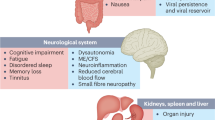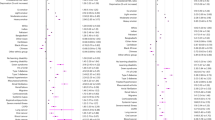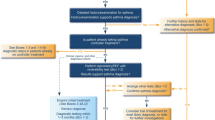Abstract
With the rising numbers of patients infected with severe acute respiratory syndrome coronavirus 2, long coronavirus disease 2019 (COVID-19)—a sequelae of COVID-19—has become a major problem. Different sexes and age groups develop different long COVID symptoms, and the risk factors for long COVID remain unclear. Therefore, we performed subgroup analyses of patients with COVID-19, classifying them into different groups. In this multicenter cohort study, using an original questionnaire, we examined patients (≥18 years old) diagnosed with COVID-19 from November 2020 to March 2022 and hospitalized at participating medical facilities. In total, 1066 patients were registered (361 female, 620 male). Hypertension was the most common comorbidity (n = 344; 32.5%). Females with hypertension were significantly less likely to develop long COVID symptoms than those without hypertension (odds ratio [OR] 0.51, 95% confidence interval [CI] 0.27–0.98; p = 0.043). In females, Ca channel blocker administration, rather than having hypertension, was significantly associated with reductions in the frequency of alopecia (OR 0.14, 95% CI 0.03–0.67, p = 0.015), memory impairment (OR 0.14, 95% CI 0.02–0.82, p = 0.029), sleeping disorders (OR 0.17, 95% CI 0.04–0.67, p = 0.012), tinnitus (OR 0.23, 95% CI 0.05–0.98, p = 0.047), sputum (OR 0.31, 95% CI 0.10–0.92, p = 0.035), and fever (OR 0.33, 95% CI 0.12–0.93, p = 0.036). Several long COVID symptoms, including alopecia, were significantly negatively associated with Ca channel-blocker administration in female patients with long COVID.

Calcium channel blockers may reduce the development of long COVID in females.
This is a preview of subscription content, access via your institution
Access options
Subscribe to this journal
Receive 12 print issues and online access
$259.00 per year
only $21.58 per issue
Buy this article
- Purchase on Springer Link
- Instant access to full article PDF
Prices may be subject to local taxes which are calculated during checkout



Similar content being viewed by others
References
Bechman K, Yates M, Mann K, Nagra D, Smith LJ, Rutherford AI, et al. Inpatient COVID-19 mortality has reduced over time: results from an observational cohort. PLOS One. 2022;17:e0261142.
Callard F, Perego E. How and why patients made long COVID. Soc Sci Med. 2021;268:113426.
Blomberg B, Mohn KG, Brokstad KA, Zhou F, Linchausen DW, Hansen BA, et al. Long COVID in a prospective cohort of home-isolated patients. Nat Med. 2021;27:1607–13.
Whitaker M, Elliott J, Chadeau-Hyam M, Riley S, Darzi A, Cooke G, et al. Persistent COVID-19 symptoms in a community study of 606,434 people in England. Nat Commun. 2022;13:1957.
Sudre CH, Murray B, Varsavsky T, Graham MS, Penfold RS, Bowyer RC, et al. Attributes and predictors of long COVID. Nat Med. 2021;27:626–31.
Groff D, Sun A, Ssentongo AE, Ba DM, Parsons N, Poudel GR, et al. Short-term and long-term rates of postacute sequelae of SARS-CoV-2 infection: a systematic review. JAMA Netw Open. 2021;4:e2128568.
Nasserie T, Hittle M, Goodman SN. Assessment of the frequency and variety of persistent symptoms among patients with COVID-19: a systematic review. JAMA Netw Open. 2021;4:e2111417.
Pływaczewska-Jakubowska M, Chudzik M, Babicki M, Kapusta J, Jankowski P. Lifestyle, course of COVID-19, and risk of Long-COVID in non-hospitalized patients. Front Med. 2022;9:1036556.
Pazukhina E, Andreeva M, Spiridonova E, Bobkova P, Shikhaleva A, El-Taravi Y, et al. Prevalence and risk factors of post-COVID-19 condition in adults and children at 6 and 12 months after hospital discharge: a prospective, cohort study in Moscow (StopCOVID). BMC Med. 2022;20:244.
Fernández-de-Las-Peñas C, Torres-Macho J, Velasco-Arribas M, Plaza-Canteli S, Arias-Navalón JA, Hernández-Barrera V, et al. Preexisting hypertension is associated with a greater number of long-term post-COVID symptoms and poor sleep quality: a case-control study. J Hum Hypertens. 2022;36:582–4.
Tleyjeh IM, Saddik B, Ramakrishnan RK, AlSwaidan N, AlAnazi A, Alhazmi D, et al. Long term predictors of breathlessness, exercise intolerance, chronic fatigue and well-being in hospitalized patients with COVID-19: a cohort study with 4 months median follow-up. J Infect Public Health. 2022;15:21–28.
Tleyjeh IM, Saddik B, AlSwaidan N, AlAnazi A, Ramakrishnan RK, Alhazmi D, et al. Prevalence and predictors of post-acute COVID-19 Syndrome (PACS) after hospital discharge: a cohort study with 4 months median follow-up. PLOS One. 2021;16:e0260568.
Subramanian A, Nirantharakumar K, Hughes S, Myles P, Williams T, Gokhale KM, et al. Symptoms and risk factors for long COVID in non-hospitalized adults. Nat Med. 2022;28:1706–14.
Terai H, Ishii M, Takemura R, Namkoong H, Shimamoto K, Masaki K, et al. Comprehensive analysis of long COVID in a Japanese nationwide prospective cohort study. Respir Investig. 2023;30:802-814.
Ishii M, Terai H, Kabata H, Masaki K, Chubachi S, Tateno H, et al. Clinical characteristics of 345 patients with coronavirus disease 2019 in Japan: a multicenter retrospective study. J Infect. 2020;81:e3–e5.
Dessie ZG, Zewotir T. Mortality-related risk factors of COVID-19: a systematic review and meta-analysis of 42 studies and 423,117 patients. BMC Infect Dis. 2021;21:855.
Adjei S, Hong K, Molinari NM, Bull-Otterson L, Ajani UA, Gundlapalli AV, et al. Mortality risk among patients hospitalized primarily for COVID-19 during the omicron and delta variant pandemic periods - United States, April 2020–June 2022. Morb Mortal Wkly Rep. 2022;71:1182–9.
Otake S, Chubachi S, Namkoong H, Nakagawara K, Tanaka H, Lee H, et al. Clinical clustering with prognostic implications in Japanese COVID-19 patients: report from Japan COVID-19 Task Force, a nation-wide consortium to investigate COVID-19 host genetics. BMC Infect Dis. 2022;22:735.
Zhang LK, Sun Y, Zeng H, Wang Q, Jiang X, Shang WJ, et al. Calcium channel blocker amlodipine besylate therapy is associated with reduced case fatality rate of COVID-19 patients with hypertension. Cell Discov. 2020;6:96.
Solaimanzadeh I. Nifedipine and amlodipine are associated with improved mortality and decreased risk for intubation and mechanical ventilation in elderly patients hospitalized for COVID-19. Cureus. 2020;12:e8069.
Guo X, Zhu Y, Hong Y. Decreased mortality of COVID-19 with renin-angiotensin-aldosterone system inhibitors therapy in patients with hypertension: a meta-analysis. Hypertension. 2020;76:e13–e14.
Nakagawara K, Namkoong H, Terai H, Masaki K, Tanosaki T, Shimamoto K, et al. Comprehensive and long-term surveys of COVID-19 sequelae in Japan, an ambidirectional multicentre cohort study: study protocol. BMJ Open Respir Res. 2021;8:e001015.
Centers for Disease Control and Prevention (CDC). https://www.cdc.gov/coronavirus/2019-ncov/long-term-effects/index.html.
Bucciarelli V, Nasi M, Bianco F, Seferovic J, Ivkovic V, Gallina S, et al. Depression pandemic and cardiovascular risk in the COVID-19 era and long COVID syndrome: gender makes a difference. Trends Cardiovasc Med. 2022;32:12–17.
Fernández-de-Las-Peñas C, Martín-Guerrero JD, Pellicer-Valero ÓJ, Navarro-Pardo E, Gómez-Mayordomo V, Cuadrado ML, et al. Female sex is a risk factor associated with long-term post-COVID related-symptoms but not with COVID-19 symptoms: the LONG-COVID-EXP-CM multicenter study. J Clin Med. 2022;11:413.
Lee H, Chubachi S, Namkoong H, Asakura T, Tanaka H, Otake S, et al. Characteristics of hospitalized patients with COVID-19 during the first to fifth waves of infection: a report from the Japan COVID-19 Task Force. BMC Infect Dis. 2022;22:935.
Jose RJ, Manuel A. COVID-19 cytokine storm: the interplay between inflammation and coagulation. Lancet Respir Med. 2020;8:e46–e47.
Hossain MA, Hossain KMA, Saunders K, Uddin Z, Walton LM, Raigangar V, et al. Prevalence of Long COVID symptoms in Bangladesh: a prospective inception cohort study of COVID-19 survivors. BMJ Glob Health. 2021;6:e006838.
Crook H, Raza S, Nowell J, Young M, Edison P. Long covid-mechanisms, risk factors, and management. BMJ. 2021;374:n1648.
Antonelli M, Pujol JC, Spector TD, Ourselin S, Steves CJ. Risk of long COVID associated with delta versus omicron variants of SARS-CoV-2. Lancet. 2022;399:2263–4.
Wise J. Covid-19: long covid risk is lower with omicron than delta, researchers find. BMJ. 2022;377:o1500.
Sheppard JP, Nicholson BD, Lee J, McGagh D, Sherlock J, Koshiaris C, et al. Association between blood pressure control and coronavirus disease 2019 outcomes in 45 418 symptomatic patients with hypertension: an observational cohort study. Hypertension. 2021;77:846–55.
Fang L, Karakiulakis G, Roth M. Are patients with hypertension and diabetes mellitus at increased risk for COVID-19 infection? Lancet Respir Med. 2020;8:e21.
Nozari F, Hamidizadeh N. The effects of different classes of antihypertensive drugs on patients with COVID-19 and hypertension: a mini-review. Int J Hypertens. 2022;2022:5937802.
Nalbandian A, Sehgal K, Gupta A, Madhavan MV, McGroder C, Stevens JS, et al. Post-acute COVID-19 syndrome. Nat Med. 2021;27:601–15.
Ohyama M, Matsudo K, Fujita T. Management of hair loss after severe acute respiratory syndrome coronavirus 2 infection: insight into the pathophysiology with implication for better management. J Dermatol. 2022;49:939–47.
Seyfi S, Alijanpour R, Aryanian Z, Ezoji K, Mahmoudi M. Prevalence of telogen effluvium hair loss in COVID-19 patients and its relationship with disease severity. J Med Life. 2022;15:631–4.
Iseki K. Chronic kidney disease in Japan. Intern Med. 2008;47:681–9.
GBD Chronic Kidney Disease Collaboration. Global, regional, and national burden of chronic kidney disease, 1990–2017: a systematic analysis for the Global Burden of Disease Study 2017. Lancet. 2020;395:709–33.
Kovesdy CP. Epidemiology of chronic kidney disease: an update 2022. Kidney Int Suppl (2011). 2022;12:7–11.
Notarte KI, de Oliveira MHS, Peligro PJ, Velasco JV, Macaranas I, Ver AT, et al. Age, sex and previous comorbidities as risk factors not associated with SARS-CoV-2 infection for long COVID-19: A systematic review and meta-analysis. J Clin Med. 2022;11:7314.
World Health Organization (WHO). https://www.who.int/europe/news-room/fact-sheets/item/post-covid-19-condition. Accessed 14 Sep 2023.
Kow CS, Ramachandram DS, Hasan SS. Use of calcium channel blockers and the risk of all-cause mortality and severe illness in patients with COVID-19: a systematic review and meta-analysis. J Cardiovasc Pharm. 2022;79:199–205.
Acknowledgements
Data management and statistical analysis were supported by 3H Medi Solution Inc., Tokyo, Japan (President: Masashi Ando).
Funding
This research was funded by the Health Labor Science Special Research Project (20CA2054 [KF]), and supported by the Japan Agency for Medical Research and Development (JP20nk0101612 [KF], JP20fk0108415 [KF], JP20fk0108452 [KF], JP21fk0108553 [KF], JP21fk0108431 [KF], JP22fk0108510 [KF], JP21fk0108563[SC], JP21fk0108573 [TA], JP22fk0108573 [TA], JP22fk0108513 [HT], JP22wm0325031[MI]) and the Japan Science and Technology Agency PRESTO (JPMJPR21R7 [HN]).
Author information
Authors and Affiliations
Contributions
All authors contributed to data analysis, drafting, and revision of the article, decided upon the target journal, and provided approval of the publication. All authors are accountable for this work.
Corresponding authors
Ethics declarations
Conflict of interest
The authors declare no competing interests.
Additional information
Publisher’s note Springer Nature remains neutral with regard to jurisdictional claims in published maps and institutional affiliations.
Rights and permissions
Springer Nature or its licensor (e.g. a society or other partner) holds exclusive rights to this article under a publishing agreement with the author(s) or other rightsholder(s); author self-archiving of the accepted manuscript version of this article is solely governed by the terms of such publishing agreement and applicable law.
About this article
Cite this article
Ozawa, T., Kimura, R., Terai, H. et al. Calcium channel blockers may reduce the development of long COVID in females. Hypertens Res 47, 934–943 (2024). https://doi.org/10.1038/s41440-023-01501-w
Received:
Revised:
Accepted:
Published:
Issue Date:
DOI: https://doi.org/10.1038/s41440-023-01501-w
Keywords
This article is cited by
-
The necessity of investigations to clarify sex and racial disparities in pathophysiology of Long COVID
Hypertension Research (2024)



